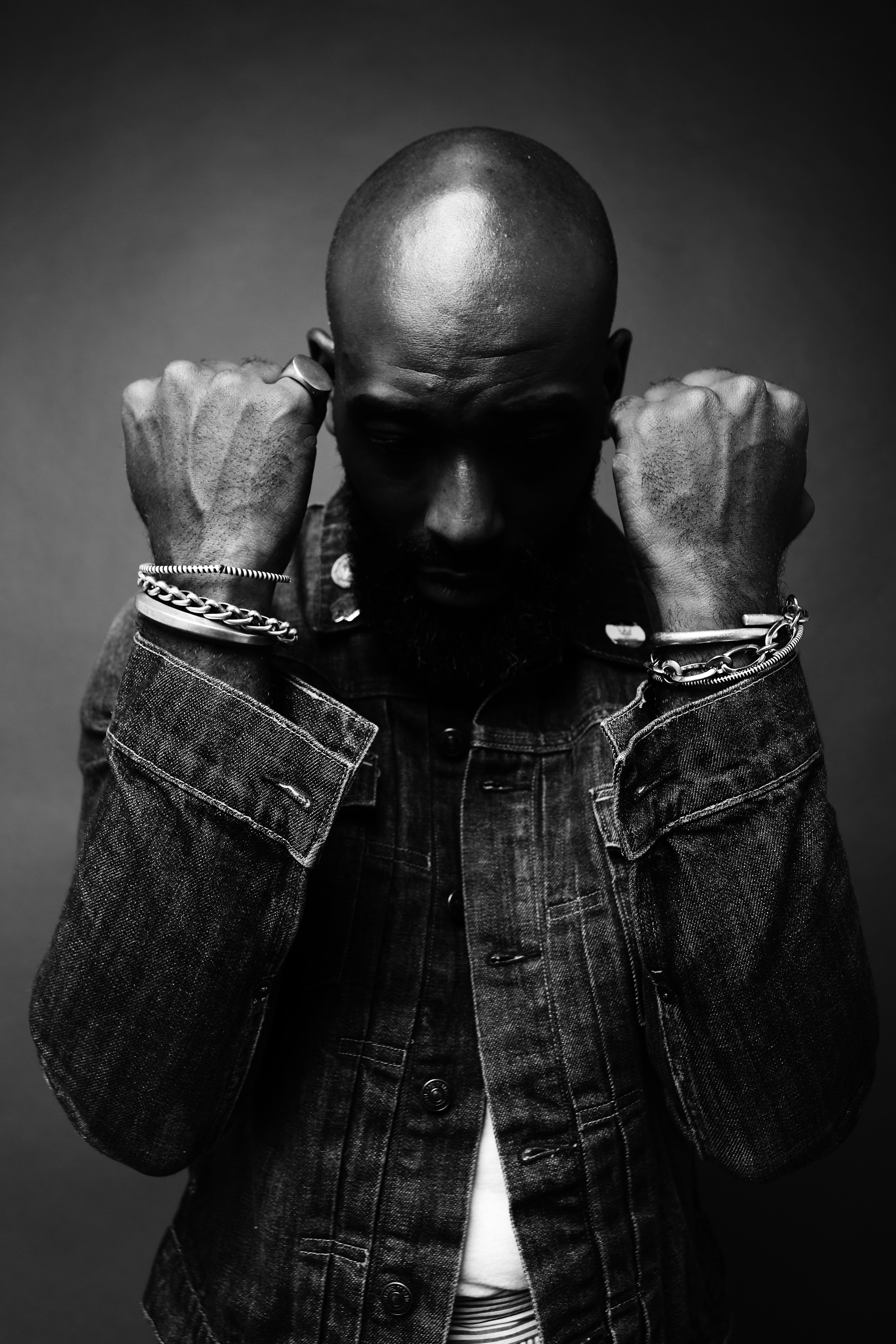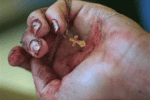and the things they treasure are worthless.
Those who would speak up for them are blind;
they are ignorant, to their own shame.
Who shapes a god and casts an idol,
which can profit nothing?
People who do that will be put to shame;
such craftsmen are only human beings.
Let them all come together and take their stand;
they will be brought down to terror and shame.
The blacksmith takes a tool
and works with it in the coals;
he shapes an idol with hammers,
he forges it with the might of his arm.
He gets hungry and loses his strength;
he drinks no water and grows faint.
The carpenter measures with a line
and makes an outline with a marker;
he roughs it out with chisels
and marks it with compasses.
He shapes it in human form,
human form in all its glory,
that it may dwell in a shrine.
He cut down cedars,
or perhaps took a cypress or oak.
He let it grow among the trees of the forest,
or planted a pine, and the rain made it grow.
It is used as fuel for burning;
some of it he takes and warms himself,
he kindles a fire and bakes bread.
But he also fashions a god and worships it;
he makes an idol and bows down to it.
Half of the wood he burns in the fire;
over it he prepares his meal,
he roasts his meat and eats his fill.
He also warms himself and says,
“Ah! I am warm; I see the fire.”
From the rest he makes a god, his idol;
he bows down to it and worships.
He prays to it and says,
“Save me! You are my god!”
They know nothing, they understand nothing;
their eyes are plastered over so they cannot see,
and their minds closed so they cannot understand. Isaiah 44:9-18 (NIV)
As reported by Yao Yuan and Zhang Yizhi of ">Xinhua, February 20, 2015 (bold in original):
FUZHOU, Feb. 20 (Xinhua) - On a downtown street in Fuzhou of east China's Fujian Province, a niche hosts a deity that will both excite and baffle fans of the classical novel Journey to the West.
Clad in golden armor and with a cudgel in hand, the Monkey King, or Qi Tian Da Sheng, quietly stares at the fruit offered by his human followers. A banyan tree at its side is surrounded by burning incense. A banner declares "every prayer will be answered".
Most Chinese associate the Monkey King with the monkey-turned-demon-slayer in the Ming Dynasty (1368-1644) novel. But here in Fuzhou, it is also a tutelary spirit worshiped at hundreds of temples and outdoor locations.
As most Chinese New Year revellers are busy venerating a ruminant at the start of the Year of the Sheep, the Monkey King is chief among a number of alternative deities popular in Fuzhou.
"[The deities are] like a guardian angel for families. Many Fuzhou families have one -- the God of Illuminating Sky, the Riverside Goddess or the Monkey King," Fuzhou resident Lin Yuemei says.
In Ruyi Hexin Temple on Fuxin Road, another Monkey King statue the size of a child is ready for a grand parade scheduled after the Chinese New Year.
"Fuzhou people call it 'the Parade of Gods', during which the King will patrol the neighborhoods under his administration and bless his people," explains You Xiang, deputy director of the temple's management committee.
Simulating a Chinese emperor's inspection tour, temple workers will carry the statue through several streets banging gongs and lighting firecrackers. Local believers will lay out tables laden with tributes to welcome the King and later join the parade, which will increase to 200 or 300 people at its culmination.
"All tributes to our King must be vegetarian, like fruit, mushrooms and tofu, as he is not only a Taoist god but also a Buddha," You adds.
MYSTERIOUS PAST
Fuzhou, capital of Fujian Province, is known for its many local beliefs -- some neighborhoods even worship a deity of their own. Many of the city's thearchy were local celebrities deified for their charitable or heroic deeds.
One prominent Fuzhou god, "Zhao Tian Jun", or God of Illuminating Sky, was said to be a Taoist monk who used red lanterns to lead residents to escape the city on the eve of a deadly riot. After his death, grateful Fuzhou people built a temple to honor him as a god of peace and safety.
But the origin of the Monkey King belief has many versions: ape worship, a monkey Buddha, a monkey demon converted by a goddess into the heavenly cause -- there are a thousand Monkey Kings in a thousand priests' eyes due to a lack of historical records.
"Unlike those orthodox deities recognized by ancient Chinese governments, our belief relies mostly on story-telling in every temple to pass it on and there are few written descriptions," You says.
One thing is certain: people in Fuzhou were worshipping the Monkey King long before the novel made the character a household name. Historical records suggest the city had a temple for the monkey in the Song Dynasty (960-1279). Some academics say the belief can be traced to the ancient worship of apes.
"Prehistoric Chinese in the mountains worshiped monkeys. The powerful Monkey King figure in the novel met the believers' expectation for an almighty god and made the belief more popular," according to Gan Mantang, a sociology professor at Fuzhou University.
Vague as his identity might be, the monkey god never lacks followers. Belief in the Monkey King has become prominent in Fujian Province, and in Fuzhou, he is worshiped in about 700 to 800 temples, says Zheng Konglin, vice head of Fuzhou's Taoist Association.
In the 1990s, the temple regarded as the Monkey King's "ancestral temple" on Fuzhou's Pingshan Mountain registered 243 offshoot temples, including in Taiwan, Hong Kong and Singapore.
SURVIVING TIMES
It was not always so. The worship was condemned as "superstitious activity" during China's Cultural Revolution (1966-1976). The ancestral temple of the Monkey King was torched while worshippers from You's temple retreated underground.
"We managed to rescue the monkey head," You says, pointing to a peach-sized head now installed on an ornately dressed statue. "Its body was gone, so we placed it on a tea cup to continue our worship."
The belief began to regain strength in the 1980s: the ancestral temple was rebuilt; Ruyi Hexin Temple resumed the Parade of Gods tradition and has seen increasing participation in recent years.
"Now, more people see it as a part of the culture, rather than superstition," says Zheng Kui, a member of the temple's committee.
The biggest threat now comes from Fuzhou's rapid urbanization and the demolition of old neighborhoods.
Many local beliefs are community-based. When the old neighborhoods were demolished and their residents relocated, the temples lost attendance.
The original Ruyi Hexin Temple and its neighborhood were demolished by the city government in 2007. The new venue built to house the celestial monkey is small and cramped, but You still felt lucky as they were resettled close to the parish.
"After all, the King still lives with his people. Many temples have been relocated far from the original sites."







































No comments:
Post a Comment